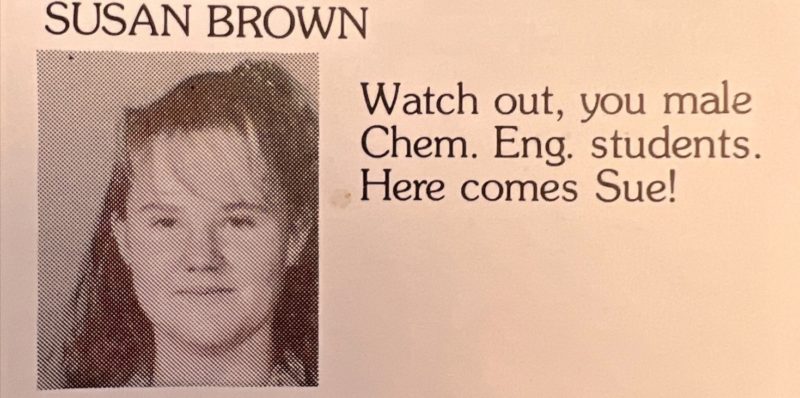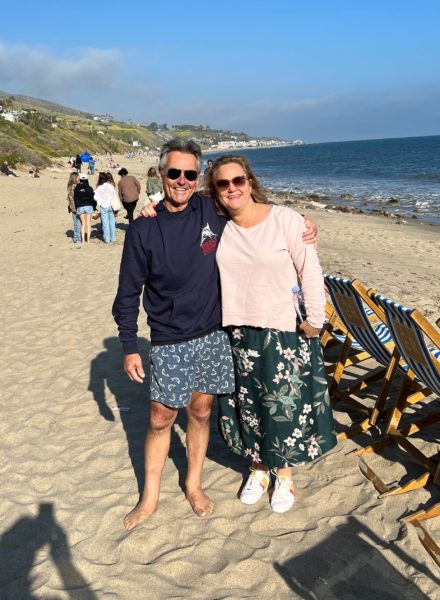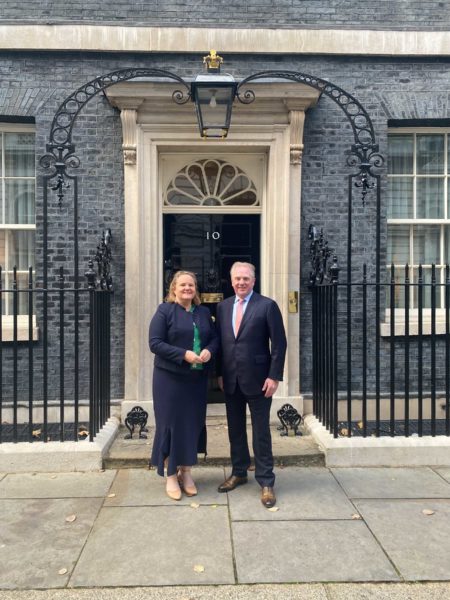In her professional life, Sue Brown has taken one job at a time with no specific ambition to be at the top of a corporate tree. And yet, from where she currently sits, the view is panoramic.
Sue graduated from Girton in 1990 (Aherne) and now reports to the CEO of a major global engineering firm, Worley, that delivers projects for the energy, chemicals and resources sectors. Worley is an Australian company with 50,000 people working in 49 countries, delivering various engineering and consultancy projects. The organisation is instrumental in delivering the projects that will decarbonise our global energy system and supply chains.
Sue’s current job title is Executive Group Director, Sustainability, and her work is as impressive as it sounds.
Sue recently attended the OGA 30-year reunion and spoke with Alumni Manager Kristi Mitchell about her life and work.
Here is what Sue had to say;
“In Year 12, I studied Maths A, Maths B, Chemistry, French, English.
At Girton, there were quite a few influential teachers. I liked Miss Pitzer for her organised and succinct way of presenting the material. These are attributes I value now in a work context. I also had a teacher called Miss Mattschoss, who taught some of the maths and chemistry subjects in Years 11 and 12. I liked her because she was very organised and methodical but would also have a laugh with us occasionally. Mr Schumann, who taught maths, was also very good.
Straight after graduating from Girton, I went to Melbourne University and completed a combined Chemical Engineering and Science degree. Approximately ten years into my career, I did some post-graduate level studies in Climate Change at the Australian National University.
When I was a teenager, I saw a documentary about pollution and the environmental impact of industry and thought it was something I’d like to help improve. Then, at Girton, I found myself in many maths/science classes with overseas students who wanted to be engineers. I had no idea what an engineer was, and I can honestly say that my fellow students at Girton even put it on my radar.
When the university ‘open days’ occurred in Melbourne, I visited the engineering schools to learn more about what they did. To be perfectly frank, my mother was not at all happy that I was going to study engineering. She was very keen that I study medicine, but that didn’t capture my imagination like engineering did.
I loved my time at Melbourne Uni and have always ‘clicked’ with fellow engineers over the course of my career. They are very smart, very humble and very can-do. The training from an engineering degree gives you very highly developed problem-solving skills that can be applied in any number of situations.
Straight out of my degree, I took the unorthodox step of working for the government with the Victorian Environment Protection Authority. I loved my time there (five and a half years). I did a lot of on-the-job learning about the different industrial companies operating in Melbourne’s western suburbs and the various environmental issues they had. I got good exposure to environmental legislation.
One of the great things about that job was that I got thrown into the deep end and was on the front line of ensuring legal compliance for all sorts of issues with big companies. At the end of my time with EPA, I worked with all the major oil companies on a range of issues, including a significant shared historical contamination issue that BP had. BP later tapped me on the shoulder and asked me to join their team and manage the environmental issues in the APAC region for their downstream assets. I had some reservations about moving ‘to the other side’, but I liked the team at BP, and they were leaders in terms of the environmental performance of all the oil companies I’d had anything to do with.
It was a really exciting time to be at BP because the global CEO, Lord John Browne, was the first to accept that climate change was due to human activity, that the oil industry had played a role and that the global energy supply needed to decarbonised. He described all this in a renowned speech at Stanford University in 1997.
I built a team at BP and really got them ready to face the increasing scrutiny that regulators were applying to their operations.
I took a break to have a couple of kids toward the end of my time with BP and then spent two years with AGL leading an environmental/sustainability team there. At AGL, I had my first involvement in reporting up to the Board level of the company. That was interesting, and AGL is also a very dynamic business and was building many large wind farms at that time, so it was exciting to learn more about that.
From AGL, I then joined WorleyParsons (now Worley). I joined WorleyParsons to lead a team of consultants. It was the first time in my career that I had profit and loss accountability. I found that very challenging, as shortly after I joined the iron ore and oil prices tanked, which meant that many companies delayed projects they had planned, and we were in the midst of a major downturn after years of boom. I spent much of my first 18 months with Worley trying to redeploy people in my team or letting them go.
Three years ago, I got a corporate role within Worley, leading our Corporate Affairs function. I loved my time in Corporate Affairs, in which I oversaw our government engagement program, focusing on elevating our corporate profile, especially in Australia, where I think we are a little-known success story.
Now I lead an agenda that is central to our company’s purpose and business strategy. I had no particular aspiration to achieve this level in corporate Australia. I have always just wanted to work in the environmental/sustainability arena with industry and to do interesting and challenging work.
Hands down, the most impactful life change, aside from having three kids and the inherent chaos it brings, is dealing with my husband’s serious and complex health issues, which developed after we were married. A few years into our marriage, my husband was diagnosed with Multiple Myeloma, an incurable blood cancer. It was picked up by chance and then laid dormant for approximately 7-8 years and had no impact on our day-to-day life. Then, in 2016, the doctors started picking up some changes in his status, leading to two years of intensive medical treatment and interventions.
I can honestly say that those two years were the most difficult of my life. I had children aged 2, 8 and 10 years and worked part-time through the period, with some chunks of leave during specific treatment regimes. It was a relentless slog for two years – waiting for test results, waiting for appointments with relevant specialists, undergoing treatment, experiencing unanticipated side effects, and various unexpected twists and turns on the way.
Having come out the other side of that intense experience has had a lasting impact on my gratitude for all I have and my ability to manage incredibly stressful situations.
I think having weathered that storm, I matured and became more resilient, which are attributes I think factored into me being in the executive role I now have at Worley.




